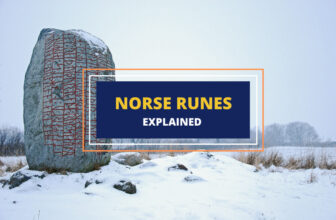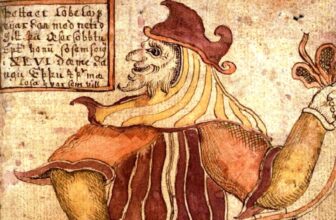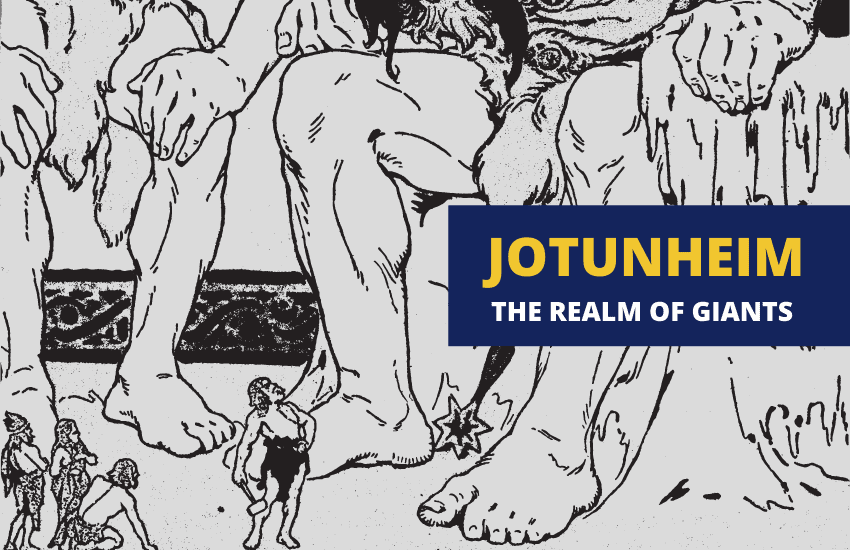
Table of Contents
Jotunheim, or Jötunheimr, is one of the Nine Realms in Norse mythology and an antithesis to the divine realm of Asgard. Unlike the orderly and gorgeous realm of the Aesir gods, Jotunheim is a desolate and harsh land where only giants, the prehistoric jötnar, and other monsters live.
The Aesir gods often ventured into Jotunheim, whether to seek adventure or to try and quell some mischief that was brewing in the wintery world. And, famously, Jotunheim’s inhabitants are the ones that Loki will lead for his assault on Asgard during Ragnarok.
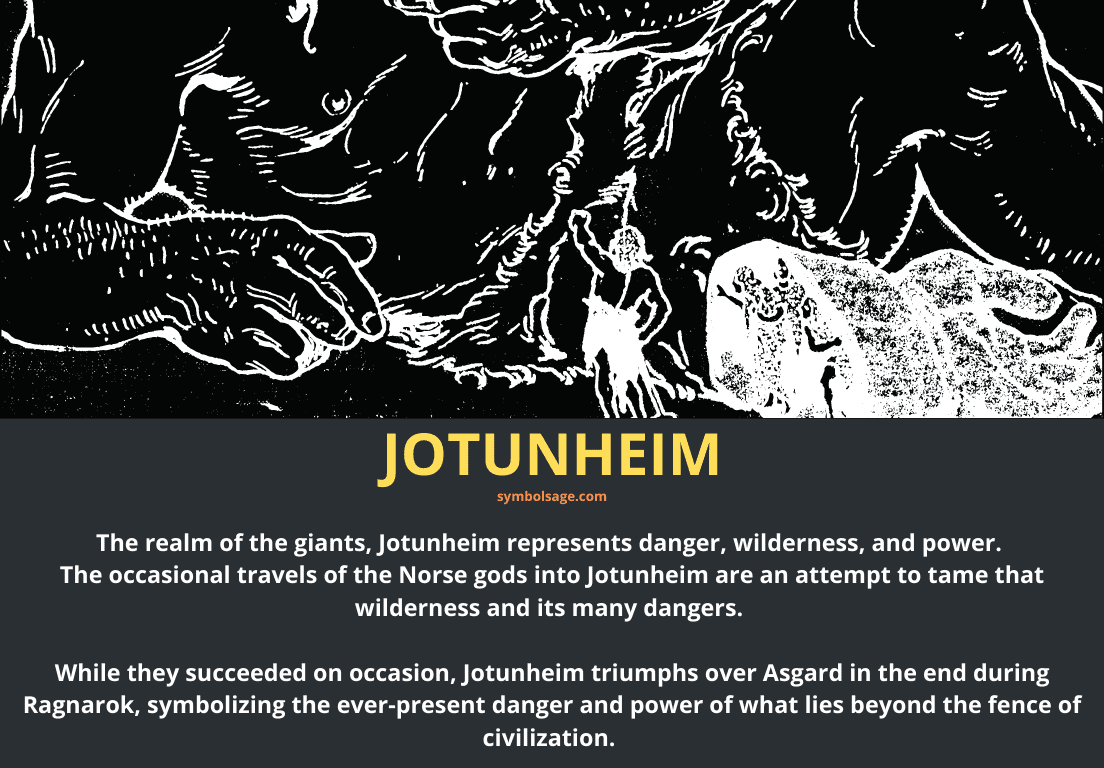
What is Jotunheim?
Jotunheim is much more than just a snowy, icy place in Norse mythology. There, the realm of giants and jötnar and its capital Utgard (i.e. “Beyond the Fence”) symbolize the wildness of the world beyond Asgard’s and Midgard’s safety (Midgard being the realm of men).
Jotunheim is separated from Asgard by the mighty river Ifingr. The wintery realm is also said to exist around the Midgard realm of men. The name Jotunheim literally translates as “Realm of the Jotun” (plural jötnar) – the prehistoric giant-like beings who the Asgardian gods had to fight away to create Asgard and Midgard.
Naturally, quite a few Norse myths take place in Jotunheim or are related to it.
The Abduction of Idunn
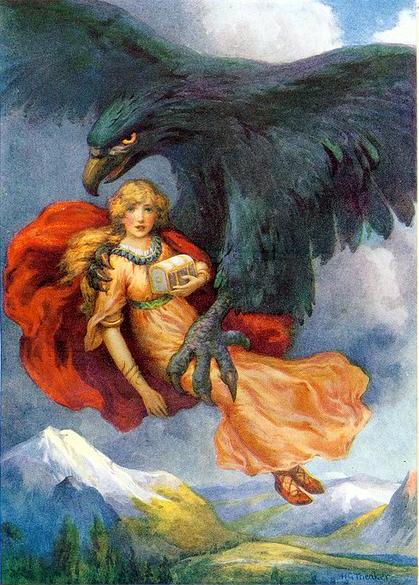
One of the popular myths taking place in Jotunheim has to do with the goddess Idunn and her apples of immortality. In this myth, the giant Þjazi, or Thjazi, transformed into an eagle and attacked Loki as the trickster god was walking about Jotunheim. Having captured Loki, Thjazi forced him to go to Asgard and rule the beautiful Idunn out so that Thjazi could take her for himself in Þrymheimr – Thjazi’s place in Jotunheim.
The gods, having started to age without Idun’s magic apples, told Loki to find a way to save Idunn from the giant’s capture. Loki transformed himself into a falcon, flew into Þrymheimr, transformed Idunn and her apple basket into a nut, took them in his claws, and flew away. Thjazi transformed into an eagle again and chased after Loki.
Once the two giant birds approached Asgard, however, the gods lit a giant bonfire under the city’s gates. Flying right above it, Thjazi’s wings caught on fire and he fell to the ground where he was slain by the gods.
Thor’s Lost Hammer

Another myth tells the story of how the jötnar king Þrymr, or Thrymr, stole Thor’s hammer Mjolnir. Once the god of thunder realized Mjolnir was missing and Asgard was without its main defense, he started shouting and crying angrily.
Having heard him, Loki decided to help for once, and took his nephew Thor to the goddess Freyja. The two borrowed the goddessess’ suit of falcon feathers and, putting it on, Loki flew to Jotunheima and met with Thrymr. The giant admitted to the theft readily and with no remorse.
Loki returned to Asgard and the gods devised a plan – Thor was to put on bridal clothes and present himself to Thrymr as Freyja, offering herself in marriage. Thor did just that and went to Jotunheim covered in a beautiful bridal gown.
Fooled, Thrymir threw a feast and began wooing Thor/Freyja. The giant did notice Thor’s insatiable appetite and glaring eyes, but Loki explained that “Freyja” just hadn’t slept or eaten in eight days out of nervous excitement for the wedding.
Eager to be done with the feast and move on with the wedding, Thrymir placed Mjolnir in Thor’s lap as a wedding gift. Lifting his hammer, Thor then proceeded in slaughtering every giant in sight in revenge for the theft.
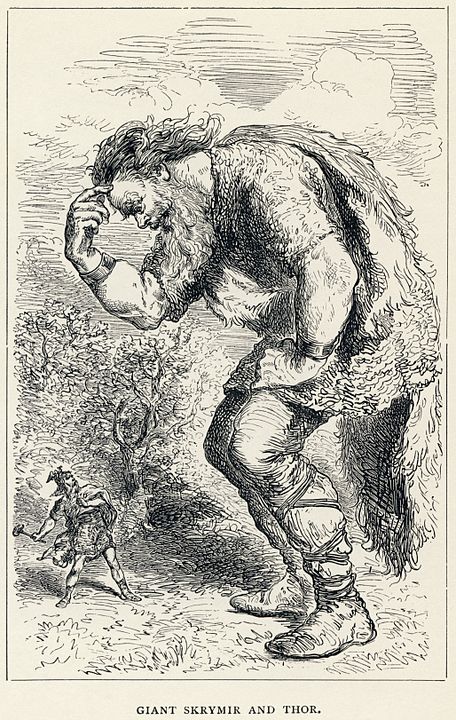
Jotunheim and Ragnarok
Lastly, the giants of Jotunheim will also take part in the great battle Ragnarok. They will be led by the trickster god Loki across the Ifingr river on the Naglfari boat, made out of the fingernails of the dead. The Jotunheim giants will charge Asgard alongside the fire giants of Muspelheim led by Surtr and will eventually be victorious in killing most of the Asgardian guards and destroying Asgard.
Symbols and Symbolism of Jotunheim
The name of Jutunheim’s capital Utgard is quite crucial in understanding how the Norse viewed Jotunheim. The innangard/utangard concept was vital for the lives of the ancient Germanic and Nordic people. In this concept, innangard literally means “inside the fence” and stands in opposition to Utgard.
All things innangard were safe and suitable for life and civilization. Utgard or utangard, however, was the deep wilderness where only the bravest heroes and hunters would dare to briefly travel. This had a spiritual and psychological meaning too, as utangard represents all deep and dangerous places where one should not go to, not just a physical space.
The occasional travels of the Norse gods and heroes into Jotunheim are an attempt to tame that wilderness and its many dangers. And, while they succeeded on occasion, Jotunheim does triumph over Asgard in the end during Ragnarok, symbolizing the ever-present danger and power of what lies beyond the fence of civilization.
Importance of Jotunheim in Modern Culture
The name and concept of Jotunheim may not be as popular as Asgard but it does have a presence in culture both historically and today. Most popularly, Jotunheim was portrayed in the 2011 MCU movie Thor, where the god of thunder and his companions ventured briefly to try and confront Laufey, the king of the frost giants. While the scene was brief, Jotunheim is more widely explored in Marvel comics.
Jotunheim was also used as the name of a mad scientist’s lab in the more recent 2021 Suicide Squad movie, only there wasn’t any actual connection to the Nordic realm in the story.
Also, fittingly, there is a Jotunheim Valley in Antarctica. It’s located in the Asgard Range and is surrounded by the Utgard Peak Mountain.
Wrapping Up
In Norse mythology, Jotunheim is the realm of the giants and a region that’s best avoided. However, several important myths take place in Jotunheim, as the gods of Asgard are compelled to travel there.




